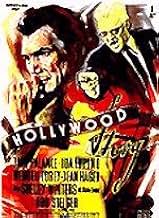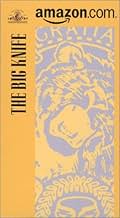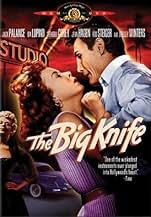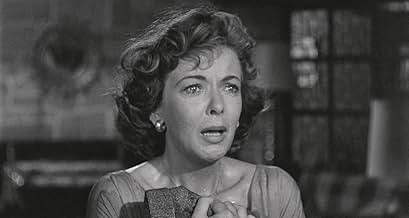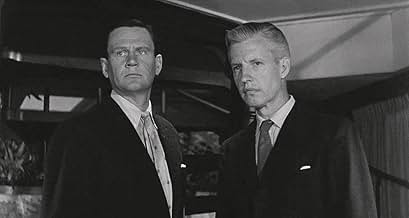IMDb RATING
6.8/10
4.7K
YOUR RATING
Hollywood actor Charles Castle is pressured by his studio boss into a criminal cover-up to protect his valuable career.Hollywood actor Charles Castle is pressured by his studio boss into a criminal cover-up to protect his valuable career.Hollywood actor Charles Castle is pressured by his studio boss into a criminal cover-up to protect his valuable career.
- Awards
- 1 win & 2 nominations total
Michael Winkelman
- Billy Castle
- (as Mike Winkelman)
Shelley Winters
- Dixie Evans
- (as Miss Shelley Winters)
Richard Boone
- Narrator
- (voice)
- (uncredited)
Nick Cravat
- Nick
- (uncredited)
Robert Emhardt
- Bit Part
- (uncredited)
Michael Fox
- Prize Fight Announcer
- (uncredited)
Paula Kyle
- Party Guest
- (uncredited)
- Director
- Writers
- All cast & crew
- Production, box office & more at IMDbPro
6.84.7K
1
2
3
4
5
6
7
8
9
10
Featured reviews
Powerhouse
Too talky for some, too stage-bound for others, too strident for all, this is not a movie for everyone. Yet The Big Knife continues to fascinate at the same time it annoys. Maybe it's the savage depiction of Hollywood politics and the amoral glamour industry surrounding it. After all, neither blackmail nor murder is off-limits to ego-maniacal studio boss Stanley Hoff ( vintage Rod Steiger), while the human sharks swimming around him behave nothing like opening night at the Oscars. Maybe it's the sterling cast, featuring such 50's exotica as Steiger, Jack Palance, Wendell Corey, and Shelley Winters. In the end, of course, everyone gets to explode on screen except the ice cold Corey whose chronic bemusement proves ultimately more satanic than cynical. Whatever the reason, the result is an over-the-top cavalcade of unusual flair.
It's likely that producer-director Robert Aldrich targeted the film in behalf of blacklisted mentor Abraham Polonsky with whom he had collaborated on 1948's Force of Evil. After all, the year was 1955 and the all-powerful list could not be attacked directly, so what better vehicle than Clifford Odet's corrosive stage play adapted for all America to see. (Odets would do the same for Broadway in 1957's revealing Sweet Smell of Success.) It's fun to imagine how Aldrich's resulting indictment played in studio screening rooms where real reputations were at stake. Then too, much of the film's dirty laundry appears based on fact. The hit and run on Clark Gable's hushed-up 1933 episode; the Palance character on John Garfield's death at 39, listed officially as heart attack. It's hard to picture the producers ever believing such curdled fare would actually make money. Of course it didn't, angering many ticket-buyers with a title that seemed to imply real action instead of endless palaver. Still, this overheated exercise in shameless baroque remains an interesting oddity. A permanent record not only of individual styles, but of artistic protest amidst the throes of cultural repression.
It's likely that producer-director Robert Aldrich targeted the film in behalf of blacklisted mentor Abraham Polonsky with whom he had collaborated on 1948's Force of Evil. After all, the year was 1955 and the all-powerful list could not be attacked directly, so what better vehicle than Clifford Odet's corrosive stage play adapted for all America to see. (Odets would do the same for Broadway in 1957's revealing Sweet Smell of Success.) It's fun to imagine how Aldrich's resulting indictment played in studio screening rooms where real reputations were at stake. Then too, much of the film's dirty laundry appears based on fact. The hit and run on Clark Gable's hushed-up 1933 episode; the Palance character on John Garfield's death at 39, listed officially as heart attack. It's hard to picture the producers ever believing such curdled fare would actually make money. Of course it didn't, angering many ticket-buyers with a title that seemed to imply real action instead of endless palaver. Still, this overheated exercise in shameless baroque remains an interesting oddity. A permanent record not only of individual styles, but of artistic protest amidst the throes of cultural repression.
Tough 50's Hollywood Nightmare!
One of the 10 best of '55 with sparks flying between Palance & Steiger. Subtle performance by Ms. Ida Lupino and intensity personified by J. Palance. Rod Steiger with white hair and hearing aid is pretty scary. Written by Clifford Odets, this realistic Hollywood tale cuts no corners and does not see out.
An 8 out of 10. Best performance = Rod Steiger. Too grim for some. Beautiful B/W cinematography and terrific script and the entire cast is deliberate and impassioned. I don't believe it was nominated for anything, but should have been. I'm not sure if this is on video or DVD, but check it out!
An 8 out of 10. Best performance = Rod Steiger. Too grim for some. Beautiful B/W cinematography and terrific script and the entire cast is deliberate and impassioned. I don't believe it was nominated for anything, but should have been. I'm not sure if this is on video or DVD, but check it out!
A restrained, almost dull, Aldrich film with terrific acting? Weirdly so.
The Big Knife (1955)
You always expect something edgy and a hair impolite with a Robert Aldrich film, from his over-the-top film noir cult classic "Detour" to the bizarre and gripping "What Ever Happened to Baby Jane?" It's almost as though his rich upbringing and rejection of a nice political life made him a fearless renegade. Give him credit. He cracked the Hollywood doldrums of the 1950s and early 60s like few other directors (Kubrick comes to mind as a big budget parallel).
So you can get a lot out of "The Big Knife" in understanding Aldrich. And you can really enjoy a superb set of performances, mainly by Ida Lupino as the leading man's wife, and by Everett Sloan in an aging version of his usual submissive chumminess. Rod Steiger is there, powerful and a bit overacted, if you can overact in an Aldrich movie, and the headliner, Jack Palance, does his best at being a leading man, and is pretty fine, especially since his role is as a Hollywood actor with flaws.
Throw in some really crisp cinematography by Ernest Lazlo, one of the best of his generation. Sometimes the camera will take on an angle that rocks you slightly, as when it is looking up from the floor at Palance on the massage table, with his agent towering overhead. More subtle is Lazlo's fluid long takes, or even fluid short takes, where the camera just makes sense of a scene not by framing it right (which is expected) but by moving it during the take. Once you notice it, you appreciate more and more how the interior of this house (the set for the whole movie) is made dimensional and alive.
I say all this up front because the movie struggles against the story and writing despite all this. It's a play adapted to the screen, but rather literally, with the one main set for all the shooting. And it talks a lot. I don't see this working even on a stage, where you want and get dialog. Here it's almost deadening. Not that it quite is ever boring, but it tries too hard, and it pulls a couple of sensational twists out as it goes, with another sensational twist at the end. On top of all that is just a level of credibility. None of these Hollywood businessmen strike you as quite right, and what they say or do is all caricature.
Not that we expect a movie, especially an Aldrich movie, to be believable. But there has to be some compensating excitement. This one, with a great noir title but no real noir qualities, never quite flies. It's worth watching if you like Lupino or Aldrich in particular, and it has moments of real intensity, but that might not be enough in the big picture.
You always expect something edgy and a hair impolite with a Robert Aldrich film, from his over-the-top film noir cult classic "Detour" to the bizarre and gripping "What Ever Happened to Baby Jane?" It's almost as though his rich upbringing and rejection of a nice political life made him a fearless renegade. Give him credit. He cracked the Hollywood doldrums of the 1950s and early 60s like few other directors (Kubrick comes to mind as a big budget parallel).
So you can get a lot out of "The Big Knife" in understanding Aldrich. And you can really enjoy a superb set of performances, mainly by Ida Lupino as the leading man's wife, and by Everett Sloan in an aging version of his usual submissive chumminess. Rod Steiger is there, powerful and a bit overacted, if you can overact in an Aldrich movie, and the headliner, Jack Palance, does his best at being a leading man, and is pretty fine, especially since his role is as a Hollywood actor with flaws.
Throw in some really crisp cinematography by Ernest Lazlo, one of the best of his generation. Sometimes the camera will take on an angle that rocks you slightly, as when it is looking up from the floor at Palance on the massage table, with his agent towering overhead. More subtle is Lazlo's fluid long takes, or even fluid short takes, where the camera just makes sense of a scene not by framing it right (which is expected) but by moving it during the take. Once you notice it, you appreciate more and more how the interior of this house (the set for the whole movie) is made dimensional and alive.
I say all this up front because the movie struggles against the story and writing despite all this. It's a play adapted to the screen, but rather literally, with the one main set for all the shooting. And it talks a lot. I don't see this working even on a stage, where you want and get dialog. Here it's almost deadening. Not that it quite is ever boring, but it tries too hard, and it pulls a couple of sensational twists out as it goes, with another sensational twist at the end. On top of all that is just a level of credibility. None of these Hollywood businessmen strike you as quite right, and what they say or do is all caricature.
Not that we expect a movie, especially an Aldrich movie, to be believable. But there has to be some compensating excitement. This one, with a great noir title but no real noir qualities, never quite flies. It's worth watching if you like Lupino or Aldrich in particular, and it has moments of real intensity, but that might not be enough in the big picture.
"Failure is not Permitted here"....
Bel Air. The well-manicured area of LA where the successful actors, producers and directors in Hollywood live. So says the opening voice- over.
Jack Palance, not the obvious choice for a leading man (& director Robert Aldrich's lame excuse for the film's box office failure) has never been better, nor has he had such a meaty role. His portrayal of pent-up anger and frustration is powerful yet still believable.
He's the washed up star who's unravelling at the seams, wrestling with a dark secret and Rod Steiger, complete with blonde hairdo as his studio manager who is out to keep a lid on bad publicity at all costs. He will stop at nothing at getting a new contract signed.
Ida Lupino is also extremely fine as Charles Castle's (Palance) wife. Their marriage is on the rocks and she pleads that Charles takes the rest that he desperately needs and to not sign. She won't go back to him otherwise. There's good support from tease Shelley Winters and as Charles' agent, Everett Sloane plus Wendell Corey as a ruthless producer.
Much of the action takes place in the Castle's vast living room, nodding to the theatrics of the original play by Clifford Odets.
This is a slow-burning, quite talky, intelligent character-led and well scripted study of Hollywood's mechanics - its layers of people. Not as flashy or melodramatic as some and certainly not as well known, but still directed with surety and skill. Today's viewer will have to adjust to the pace and style but that's easy and the rewards to those attuned can be high.
There's enough depth to the material for a second viewing, which helps bring out the characters even more vividly.
Jack Palance, not the obvious choice for a leading man (& director Robert Aldrich's lame excuse for the film's box office failure) has never been better, nor has he had such a meaty role. His portrayal of pent-up anger and frustration is powerful yet still believable.
He's the washed up star who's unravelling at the seams, wrestling with a dark secret and Rod Steiger, complete with blonde hairdo as his studio manager who is out to keep a lid on bad publicity at all costs. He will stop at nothing at getting a new contract signed.
Ida Lupino is also extremely fine as Charles Castle's (Palance) wife. Their marriage is on the rocks and she pleads that Charles takes the rest that he desperately needs and to not sign. She won't go back to him otherwise. There's good support from tease Shelley Winters and as Charles' agent, Everett Sloane plus Wendell Corey as a ruthless producer.
Much of the action takes place in the Castle's vast living room, nodding to the theatrics of the original play by Clifford Odets.
This is a slow-burning, quite talky, intelligent character-led and well scripted study of Hollywood's mechanics - its layers of people. Not as flashy or melodramatic as some and certainly not as well known, but still directed with surety and skill. Today's viewer will have to adjust to the pace and style but that's easy and the rewards to those attuned can be high.
There's enough depth to the material for a second viewing, which helps bring out the characters even more vividly.
A very well done film with mostly great performances and intelligent writing, but won't appeal to everybody
The Big Knife is not for everybody. Some will find it very literate, well-directed and acted(mostly), handling the tense and satire aspects deftly, while others will find it overdone. Both viewpoints are completely understandable, for me there were parts where the film did fall into the latter camp but most of the time it was the former.
As an adaptation of the stage play, which is very compelling and thought-provoking, it is very faithful and translates well adaptation-wise. As a film, it's far from perfect but it comes over well as a film.
There are a few things that don't come off quite as successfully as the rest of the film. Rod Steiger has a very ruthless character, but for my tastes Steiger plays the role too broadly to the point that Hoff felt more of a cartoonish caricature than a real person, to the extent that it came close to hurting the balance of the film and he didn't come over as very threatening. In his performance, there is a lot of camp and scenery-chewing, but not enough of the menace that the role so ruthlessly written needs. The ending does dissolve into contrived melodrama, which is where it is most understandable as to why some will find the film overdone, and felt rushed as well. Lastly, the film does feel over-scored in places, in the places where there is music the blaring music cues felt intrusive.
With the exception of Steiger, the performances are very good. Jack Palance's powerhouse lead performance is one of his best, while Ida Lupino is heart-wrenching and dignified. Wendall Corey wisely underplays and is very entertaining, and Everett Sloane, Jean Hagen(chilling in a role so different to hers in Singin' In the Rain) and a memorable Shelley Winters(in a performance that hits hard) do equally pleasingly. The script is remarkably literate and intelligent, with the tension being portrayed quite realistically and the satire being boldly lacerating. The story moves deliberately, but the tension present is enough to haunt the mind and the subject matter is a bold one and told in a biting, sometimes fun and poignant way. The Big Knife is photographed with class and atmosphere, the production values are appropriately claustrophobic and Robert Aldrich's direction is more than able, often excellent.
Overall, a very acquired taste, but for this viewer while not without flaws it was a well done film. 7/10 Bethany Cox
As an adaptation of the stage play, which is very compelling and thought-provoking, it is very faithful and translates well adaptation-wise. As a film, it's far from perfect but it comes over well as a film.
There are a few things that don't come off quite as successfully as the rest of the film. Rod Steiger has a very ruthless character, but for my tastes Steiger plays the role too broadly to the point that Hoff felt more of a cartoonish caricature than a real person, to the extent that it came close to hurting the balance of the film and he didn't come over as very threatening. In his performance, there is a lot of camp and scenery-chewing, but not enough of the menace that the role so ruthlessly written needs. The ending does dissolve into contrived melodrama, which is where it is most understandable as to why some will find the film overdone, and felt rushed as well. Lastly, the film does feel over-scored in places, in the places where there is music the blaring music cues felt intrusive.
With the exception of Steiger, the performances are very good. Jack Palance's powerhouse lead performance is one of his best, while Ida Lupino is heart-wrenching and dignified. Wendall Corey wisely underplays and is very entertaining, and Everett Sloane, Jean Hagen(chilling in a role so different to hers in Singin' In the Rain) and a memorable Shelley Winters(in a performance that hits hard) do equally pleasingly. The script is remarkably literate and intelligent, with the tension being portrayed quite realistically and the satire being boldly lacerating. The story moves deliberately, but the tension present is enough to haunt the mind and the subject matter is a bold one and told in a biting, sometimes fun and poignant way. The Big Knife is photographed with class and atmosphere, the production values are appropriately claustrophobic and Robert Aldrich's direction is more than able, often excellent.
Overall, a very acquired taste, but for this viewer while not without flaws it was a well done film. 7/10 Bethany Cox
Did you know
- TriviaBecause of its vitriolic take on Tinseltown, this was unsurprisingly turned down by all the major studios in Hollywood. It eventually found a home at United Artists.
- GoofsThe camera and operator are visibly reflected in one scene in the living room.
- Quotes
Smiley Coy: A woman with six martinis can ruin a city.
- Crazy creditsIn the opening credits: Upholstered furniture by Martin/ Brattrud.
- ConnectionsFeatured in Les dossiers de l'écran: Les coulisses du cinéma (1970)
- How long is The Big Knife?Powered by Alexa
Details
Box office
- Budget
- $423,000 (estimated)
- Runtime
- 1h 51m(111 min)
- Color
- Aspect ratio
- 1.85 : 1
Contribute to this page
Suggest an edit or add missing content


